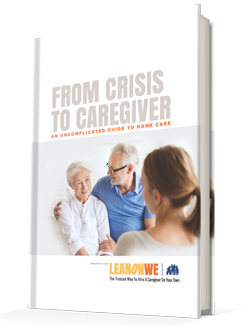How to Set Boundaries With Aging Parents

When you have agreed to care for your mother or father as they age, the job you started doing can sometimes become too much.
One in three adults serves as an informal family caregiver, and 66% of unpaid caregivers reported feeling stress, burnout, anxiety, or other similar conditions.
When the pressures of caring for a parent on top of your own life add up, it’s time to set boundaries. Boundaries are not a negative thing; they can be useful for establishing a healthy relationship as the dynamic between you and your loved ones changes.
In this piece, we’ll show you how to set boundaries with your parents as they age.
» Download our free guide to home care, "From Crisis to Caregiver."
Why it is Important to Set Boundaries
For years, your parents may have put you at the center of their world.
Now, as they age, you find yourself in the caregiver role, a natural but challenging transition. While the desire to care for your parents comes from love and duty, a lack of boundaries can lead to stress, burnout, and strained family relationships.
You may feel guilty about needing to set boundaries with your parents or that broaching the subject may lead to a tense relationship. However, the opposite is true: Without clear boundaries, mounting stress and resentment are more likely to sour your relationship.
Tips for Setting Boundaries With Aging Parents
Whether you’ve just started to have the conversation with Mom or feel like you’ve tried and failed numerous times, the following tips will help you set boundaries:
- Identify the issues
- Set boundaries gradually
- Establish routines
- Lead with empathy
- Ask for help
Identify the Issues
Identifying the issues that lead to boundaries being required is a good starting point. This will need a bit of careful observation and reflection to pinpoint the specific behaviors/situations that cause stress and conflict.
For example, imagine you notice your mother calling you multiple times during work hours with non-emergency questions about using her smartphone or computer. After reflection, you realize these interruptions affect your job performance and cause you unnecessary stress. Starting with an honest assessment and reflection can focus your conversations with your parents.
Set Boundaries Gradually
Setting boundaries gradually allows both you and your parents to adjust to new relationship dynamics without feeling overwhelmed.
For example, let’s say Dad drops by unannounced several times a week. Instead of immediately banning unexpected visits, you might start by saying, "Dad, I love seeing you, but I'd feel more present if we planned our visits. Could we set up regular Sunday dinners and maybe a mid-week coffee?" This gentle approach lessens the burden on you while not feeling abrupt.
Establish Routines
Similarly, having regular scheduled visits, designated times for phone calls, or specific days for helping with errands can reduce anxiety and prevent misunderstandings. These routines give your parents security in knowing when they'll see or hear from you while protecting your personal time.
You could create a shared digital or written calendar with your parents, marking your dedicated time together. For instance, weekly help with grocery shopping or monthly family dinners can bring clarity and consistency to your care and prevent guilt trips about "never seeing you."
Lead With Empathy
Leading with empathy means approaching boundary-setting conversations with understanding and compassion for your parents' perspective.
Remember that they love you and may be struggling with loss of independence, health concerns, or fear of becoming irrelevant in your life. These are difficult emotions for them to navigate, and because of that, it is helpful to acknowledge their feelings while firmly maintaining your boundaries. Leading with empathy involves them in the conversation and solution rather than making it feel one-sided.
Ask For Help
You don’t have to go through this alone.
Asking for help is not a strike against your ability to care; it’s a step toward ensuring your parents get the best care possible while your well-being and space are respected.
This might mean involving siblings or other family members in caregiving responsibilities, consulting a Geriatric Care Manager for guidance, or joining support groups for adult children of aging parents. There are professional solutions as well, though it is easy to feel overwhelmed by the options. We’ll explore hiring a caregiver to support your loved one next.
A Caregiver Can Help
There is a way to ensure your loved ones have full-time supervision and care while remaining at home: Hire a caregiver.
Hiring a caregiver allows Mom to remain in the comfort and familiarity of her home while receiving professional support. Caregivers can assist with showering and toileting, run errands, and prepare meals while giving you much-needed breathing room.
Aging in place with a caregiver allows your loved one to maintain her existing routines and connection to the neighborhood while freeing you up from the responsibility of being the primary caregiver. However, you need to make sure you find the right caregiver; for that, we have a free gift for you.
Thinking About Home Care? Download Our Free Guide “From Crisis to Caregiver”
Sometimes, your loved one might need more help than you can provide; this is where hiring a caregiver can be helpful.
If the thought of hiring a caregiver makes you feel overwhelmed, we recommend downloading our free eBook, “From Crisis to Caregiver: An Uncomplicated Guide to Home Care.”
This eBook discusses the ins and outs of hiring a caregiver, arming you with a trustworthy resource to make the best decision for your loved one. Our eBook takes a no-nonsense look at:
- The realities of financing senior care.
- Straight talk about the pros and cons of the three common home care options.
- Our own stories of hiring caregivers are a way to highlight the unexpected pitfalls you’ll want to avoid.
Click the button below to download the free guide and take the first step toward approaching the hiring process with confidence and peace of mind.

